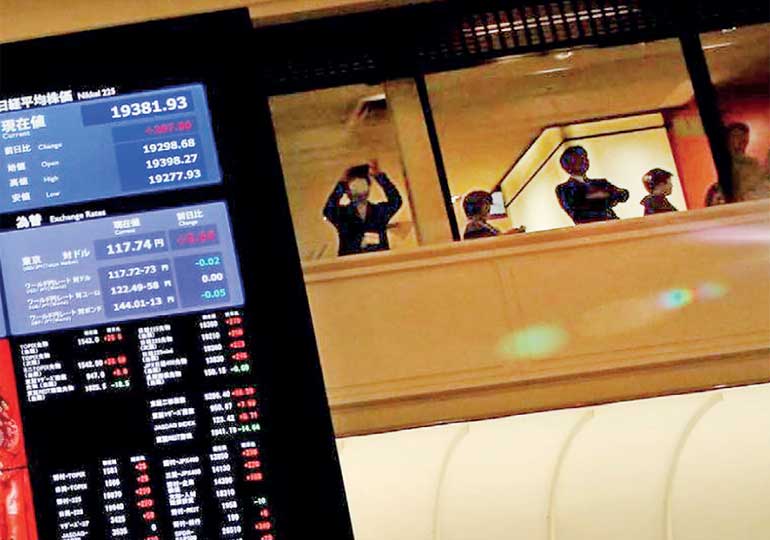Sunday Feb 22, 2026
Sunday Feb 22, 2026
Tuesday, 24 January 2017 00:04 - - {{hitsCtrl.values.hits}}

Tokyo (Reuters): The dollar slid broadly on Monday after US President Donald Trump struck a protectionist tone in his inauguration speech, undermining optimism over the US economy spurred by his promises of tax cuts and other stimulus.
Japan’s Nikkei dropped 1.1% while shares in Australia dropped 0.8% after the Trump administration, on its first day in office, declared its intention to withdraw from the Trans-Pacific Partnership (TPP), a 12-nation trade pact that Japan and Australia also have signed up for.
US stock futures dipped 0.3%, erasing gains made on Friday.
European shares were expected to fall, too, with spread-betters looking to a drop of 0.4% in Britain’s FTSE and 0.3% in Germany’s DAX.
Other Asian shares were more resilient, however, in part due to the dollar’s weakness and a relief that there was no negative surprises, with Trump refraining from labeling China as a currency manipulator for now, an accusation he made while campaigning.
“At least, there was no negative news this weekend, like a border tax or the currency manipulator, even though they could come up in the future,” said Yukino Yamada, senior strategist at Daiwa Securities.
MSCI’s broadest index of Asia-Pacific shares outside Japan rose 0.3%, with Taiwan shares leading the gains and coming just shy of 1-1/2-year highs.
In his inaugural address, Trump pledged to end what he called an “American carnage” of rusted factories and vowed to put “America first,” laying out two simple rules - buy American and hire American.
Trump also said on Sunday he plans talks soon with the leaders of Canada and Mexico to begin renegotiating the North American Free Trade Agreement (NAFTA).
“The market is getting nervous about the possibility that the world’s trade might shrink,” said Koichi Yoshikawa, executive director of financial markets at Standard Chartered Bank in Tokyo.
“Many of his policies, including tax cuts and infrastructure spending, need approval from the Senate and that (may not be) easy,” he said. “The markets that had been led by expectations on his policy since the election are now the dragged down by the reality.”
The dollar had soared late last year on expectations that Trump’s pledges to cut taxes and hike infrastructure spending would boost the US economy, spurring inflation and higher interest rates.
But optimism is starting to fade as details of his tax policies remained sketchy. It is not clear if the Congress will agree to any plan that could drastically increase budget deficits. “If all of Trump’s tax proposals would be implemented, that alone would increase the deficit by more than two percentage points of GDP. It’s questionable if the Republicans will agree to that. Any fiscal stimulus will be a mild one,” said Hiroko Iwaki, senior strategist at Mizuho Securities.
The dollar fell as much as 1.2% against the yen to 113.26 yen, edging towards its seven-week low of 112.57 yen touched on Wednesday. The euro gained 0.5% to $1.0754, its highest level since 8 December. Emerging market currencies gained, with South African rand gaining 0.8%.
The Mexican peso, which has weakened the most on Trump’s protectionist and anti-immigration stance, rose 0.8% to a two-week high of 21.415 per dollar. The rise came after its 1.7% gains on Friday, its biggest in two months. Gold hit a two-month high of $ 1,219.3 per ounce. The 10-year US Treasuries yield fell to 2.435%, after having risen briefly on Friday to 2.513%, its highest since 3 January.
The two-year yield, which is more sensitive to the Fed’s policy outlook, dropped sharply to 1.180% from Thursday’s three-week high of 1.250%, giving back much of gains made after Wednesday’s upbeat comments from Federal Reserve Chair Janet Yellen.
Oil steadied after Friday’s gains, as support from statements over the weekend from OPEC and other producers that they have been successfully in implementing output cuts were offset by a surge in US drilling. International benchmark Brent crude futures stood at $ 55.47 per barrel, little changed after Friday’s 2.5% gains.
Singapore (Reuters): Asian currencies rose on Monday as the dollar fell after U.S. President Donald Trump’s inauguration speech disappointed some investors who were looking for more details on his plans for fiscal stimulus.
Trump’s first address as president on Friday highlighted his “America first” policies that were short on specific proposals, and disappointed investors hoping for details on his plans to stoke growth, spend on infrastructure and reduce taxes.
“Overall, investors were disappointed that Trump did not provide details on his plans to stimulate the U.S. economy at his...inauguration speech,” analysts for DBS Bank said in a research note.
“For now, the market continues to view the current U.S. dollar fall as a correction,” they added.
Emerging Asian currencies rose broadly, including the Chinese yuan and the Singapore dollar, which both rose around 0.5%.
Investors are waiting for Trump and his administration to flesh out details of fiscal stimulus plans over their first 100 days in office, analysts said.
“If there’s a greater certainty that stimulus will be quite significant in this year, then I expect the dollar to really be rallying strongly,” said Chang Wei Liang, FX strategist for Mizuho Bank in Singapore.
Such a dollar rally could occur toward the end of Trump’s first 100 days in office, once there is more clarity on his fiscal policies, Chang said.
“But if the stimulus proves to be a bit more of a medium-term thing, then there could be some corresponding amount of paring of (long) dollar positions,” he added.
In his inaugural address, Trump pledged to end what he called an “American carnage” of rusted factories and vowed to put “America first”, laying out two simple rules - buy American and hire American.
Trump’s new administration said on Friday its trade strategy to protect American jobs would start with withdrawal from the 12-nation Trans-Pacific Partnership (TPP) trade pact.
A White House statement issued soon after Trump’s inauguration said the United States would also “crack down on those nations that violate trade agreements and harm American workers in the process.”
Asian currencies have historically tended to weaken in the weeks after the U.S. president’s inauguration speech, Alastair Pinder, Asian FX strategist for HSBC, said in a research note. “Trump’s focus on the economy and trade protectionism during his inauguration suggest this time will be no different,” Pinder wrote.
“Rhetoric from Trump’s team towards the likes of China has already intensified in recent months and if this escalates further, we believe volatility in Asian currencies will be sure to rise,” Pinder added.

Reuters: Gold prices rose on Monday to their highest in two months as investors sought safer assets amid uncertainty around the economic policies of new US President Donald Trump and as the dollar declined against other major currencies.
Spot gold was up 0.64% at $1,217.26 per ounce by 0617 GMT. Earlier in the session, it hit $1,219.43, the highest since 22 November.
US gold futures climbed as much as 1% to $1,217.